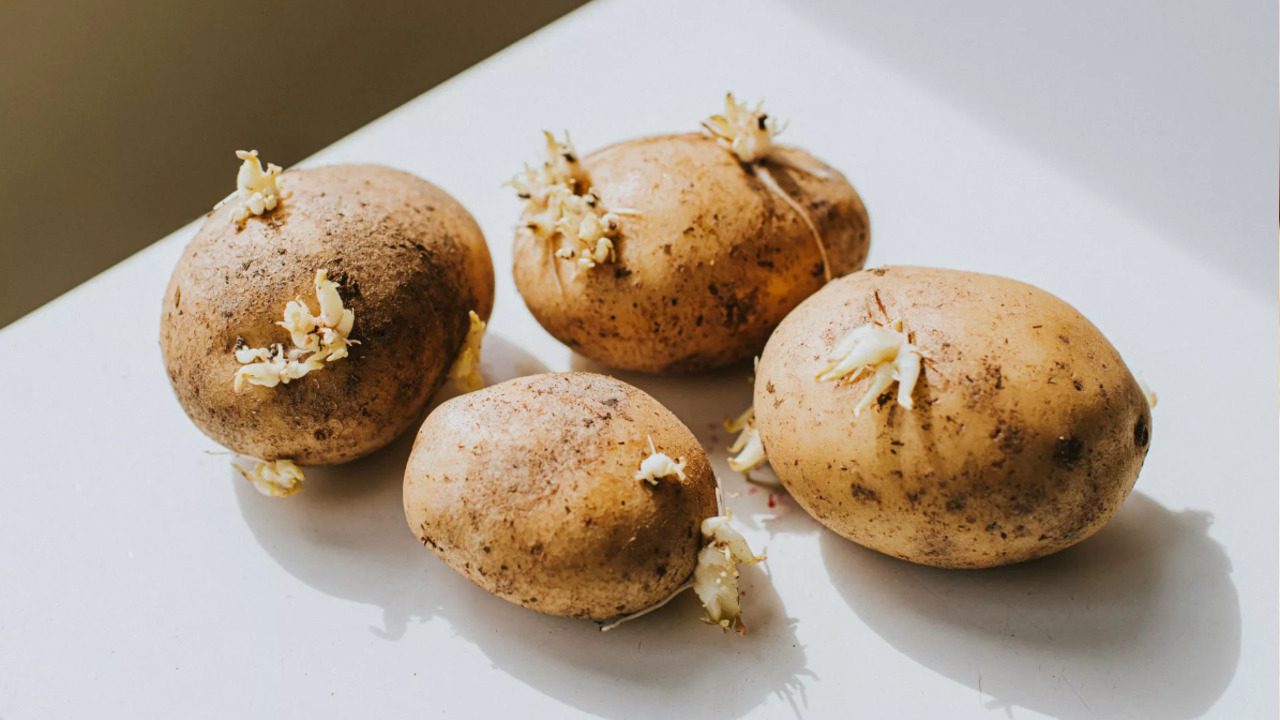Cleaning and preparing potatoes before cooking them is essential to ensure they are safe to eat and taste their best. But, most people did not know how to clean and prep potatoes.
To clean and prep potatoes for cooking, rinse them, scrub them, peel them (optional), and cut them into the desired shape and size.
Below are some valuable instructions on how to clean potatoes for cooking.
How to Clean Potatoes For Cooking
Potatoes are a versatile and delicious vegetable that can be enjoyed in a variety of ways.
But before you can start cooking, it’s important to know that, how to clean your potatoes for cooking. This will remove any dirt or debris from the surface of the potato, and it will also help to prevent the spread of bacteria.
What you’ll need:
- Potatoes
- Cold water
- Vegetable brush or clean dishcloth
- Peeler (optional)
Instructions
- Rinse the potatoes. Place the potatoes in a colander and rinse them under cold running water. This will help to loosen any dirt or debris on the surface of the potato.
- Scrub the potatoes. Use a vegetable brush or clean dishcloth to scrub the potatoes under cold running water. Pay special attention to the eyes of the potato, as dirt can often accumulate there.
- Peel the potatoes (optional). If you prefer to peel your potatoes, you can do so now. Use a vegetable peeler to remove the thin outer layer of the potato.
- Rinse the potatoes again. Give the potatoes another quick rinse under cold running water to remove any remaining dirt or debris.
- Pat the potatoes dry. Use a paper towel to pat the potatoes dry. This will help to prevent them from sticking to the pan when you’re cooking them.
How to Clean and Prep Potatoes For Cooking
To clean and prep potatoes for cooking, follow these simple steps:
1. Wash Your Hands
Before washing your potatoes, wet your hands and lather them using soap for 20 seconds.
2. Rinse the Potatoes

Washing your potatoes under running water is the most acceptable method. That will release any dirt particles that have accumulated on its skin. Lukewarm or chilly water will suffice.
3. Begin Scrubbing

To clean the potatoes, use a vegetable scrubber or brush and scrub them clockwise. If the scrubber gets soiled while washing, rinse it with cold water. This simple step will help you prepare your potatoes for cooking in no time!
A clean kitchen scrub brush, abrasive gloves, or a kitchen towel can also be used.
4. Look for any Concealed Dirt

Remove any green sprouts that you discover. Pay particular care to the potato’s eyes since land is frequently concentrated there.
5. Rinse and Pat Dry
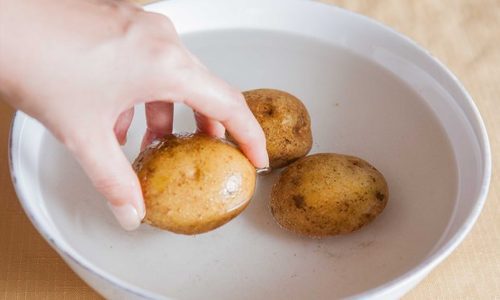
Give the scraped potato another short rinse under cold water to remove surface dirt, then pat dry with a towel.
6. Putting Potatoes In A Dishwasher For Cleaning
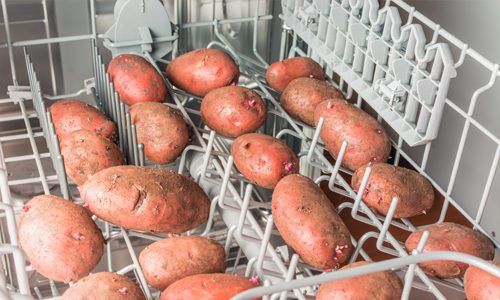
Unwashed potatoes may be washed on the countertops in your dishwasher during the rinse cycle. Before this procedure, ensure the washer is clean and clear of soap or detergent.
Alternatively, soak your potatoes in a dish of lukewarm water for around twenty minutes instead of washing them.
7. Storage Time of Potatoes
Under the right circumstances, uncooked potatoes can be stored for up to two months. Potatoes can also be frozen and stored for up to three months.
On the other hand, cooked, boiled, and peeled potatoes only survive one to two hours if placed on a countertop. When exposed to fresh air, oxidation occurs, and the potato’s flesh becomes brown.
Best Ways to Keep Raw and Cooked Potatoes
You’ll need to keep cooked potatoes differently than raw potatoes.
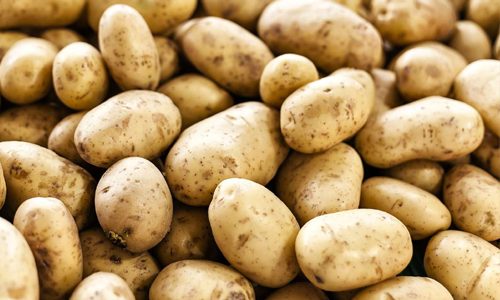
Way 1 – Cooked
Store cooked potatoes in cold water with a splash of lemon juice or vinegar if you wish to eat them later.
Refrigerate the bowl after covering it with an airtight lid. The potatoes should survive for 24 hours before they begin to oxidize.
Way 2 – Uncooked
Store raw potatoes in a dish or a paper bag in a cold, dark area with plenty of ventilation (plastic bags trap moisture and cause the spuds to spoil).
Avoid keeping potatoes in the fridge because the cold temperature converts the starch in the potato into sugar, which, when heated, generates a potentially hazardous toxin called acrylamide.
Do You Have to Peel Potatoes?
This is an argument against peeling potatoes.
Moreover, the skins are high in roughage, vitamins, and minerals. Leave them on if they are in excellent condition and play an essential role in the recipe. Thin-skinned potatoes, such as red and Yukon Gold, create delicious mashed potatoes, and skipping the peeling saves time in the kitchen.
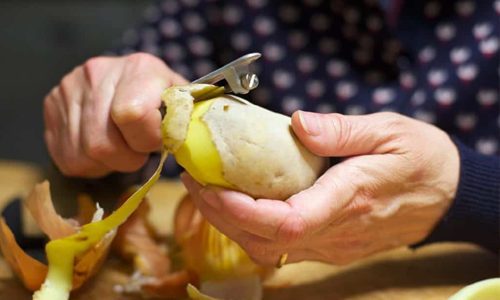
Although Russet potato skins may not contribute much to the texture of mashed potatoes, they can impart a delightful taste to French fries. On the other hand, when preparing certain dishes like scalloped potatoes, gnocchi, or the classic baked potato, it’s better to remove the skins for a smoother consistency.
Then, by all means, break out the peeler!
FAQs
Why is it essential to clean potatoes before cooking?
Potatoes are grown in soil and, therefore, can be dirty and carry bacteria or pesticides on their skin. Cleaning them ensures they are safe to eat and removes any unwanted debris.
How should I wash potatoes?
To prepare the potatoes, rinse them thoroughly under running water and use a vegetable brush to scrub the skin delicately. Ensure you eliminate any soil or particles lodged in the potato’s crevices.
Do I need to peel the potatoes before cooking?
It depends on personal preference and the recipe. Many recipes call for peeled potatoes, but the skins can add texture and nutrients to dishes.
How should I prepare potatoes for boiling?
Peel and cut the potatoes into evenly sized pieces to ensure they cook evenly. Please place them in a pot of cold water and bring them to a boil. Cook until the potatoes are tender when pierced with a fork.
Can I prepare potatoes ahead of time?
You can peel and cut the potatoes beforehand, but store them in a bowl of cold water to prevent browning. Drain and dry them before cooking.
How can I tell when the potatoes are done cooking?
Pierce the potatoes with a fork or knife. If they are soft and tender, they are done.
How should I store leftover cooked potatoes?
Store them in an airtight container in the refrigerator for up to four days.
